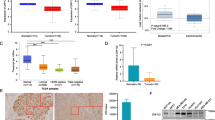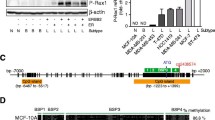Summary
Taxanes are among the most active agents and they are now known to be an indispensable component in chemotherapy for breast cancer. However, some patients are resistant to taxanes and the identification of the molecular characteristics that can predict the sensitivity to taxanes would be useful in selecting the most appropriate patients to receive taxane therapy. Taxanes are antimicrotubular agents that promote microtubular assembly and stabilize microtubules by preventing depolymerization. They interfere with normal mitotic transition and causes cell cycle arrest in the G2-M metaphase. CHFR (checkpoint with forkhead-associated and ring finger) is a recently identified gene, which functions as an important checkpoint protein early in G2-M transition. Its activation delays the cell cycle in prophase and promotes cell survival in response to the mitotic stress induced by either nocodazole or taxane. CHFR is frequently downregulated in human cancers, mostly owing to the hypermethylation of its promoter region. CHFR downregulation has been found in primary cancers or in the established tumor cells of various origins, such as the lung, colon, esophagus, and stomach. The aberrant hypermethylation of CHFR promoter appears to be a good molecular marker to predict sensitivity to taxanes in gastric, lung, and colon cancer. A downregulation of CHFR was observed in breast cancer cells, however, no apparent promoter hypermethylation has yet been reported. In addition, an alteration of the CHFR expression or aberrant promoter hypermethylation in primary breast cancer has not been fully investigated. In this study, we examined the methylation status of the promoter region of CHFR gene in 110 primary breast cancers. We observed the hypermethylation of the CHFR promoter region in only one case (0.9%). We herein show that the aberrant hypermethylation of this region is quite a rare event in primary breast carcinoma.
Similar content being viewed by others
References
Nowak AK, Wilcken NR, Stockler MR, Hamilton A, Ghersi D, 2004 Systematic review of taxane-containing versus non-taxane-containing regimens for adjuvant and neoadjuvant treatment of early breast cancer Lancet Oncol 5: 372–380
Crown J, O’Leary M, Ooi WS, 2004 Docetaxel and paclitaxel in the treatment of breast cancer: a review of clinical experience Oncologist 9(Suppl 2): 24–32
Tang C, Willingham MC, Reed JC, Miyashita T, Ray S, Ponnathpur V, Huang Y, Mahoney ME, Bullock G, Bhalla K, 1994 High levels of p26BCL-2 oncoprotein retard taxol-induced apoptosis in human pre-B leukemia cells Leukemia 8: 1960–1969
Huang Y, Ibrado AM, Reed JC, Bullock G, Ray S, Tang C, Bhalla K, 1997 Co-expression of several molecular mechanisms of multidrug resistance and their significance for paclitaxel cytotoxicity in human AML HL-60 cells Leukemia 11: 253–257
Giannakakou P, Sackett DL, Kang YK, Zhan Z, Buters JT, Fojo T, Poruchynsky MS, 1997 Paclitaxel-resistant human ovarian cancer cells have mutant beta-tubulins that exhibit impaired paclitaxel-driven polymerization J Biol Chem 272: 17118–17125
Yu D, Jing T, Liu B, Yao J, Tan M, McDonnell TJ, Hung MC, 1998 Overexpression of ErbB2 blocks Taxol-induced apoptosis by upregulation of p21Cip1, which inhibits p34Cdc2 kinase Mol Cell 2: 581–591
Gelmon K, 1994 The taxoids: paclitaxel and docetaxel Lancet 344: 1267–1272
Donaldson KL, Goolsby GL, Kiener PA, Wahl AF, 1994 Activation of p34cdc2 coincident with taxol-induced apoptosis Cell Growth Differ 5: 1041–1050
Sudo T, Nitta M, Saya H, Ueno NT, 2004 Dependence of paclitaxel sensitivity on a functional spindle assembly checkpoint Cancer Res 64: 2502–2508
Cahill DP, da Costa LT, Carson-Walter EB, Kinzler KW, Vogelstein B, Lengauer C, 1999 Characterization of MAD2B and other mitotic spindle checkpoint genes Genomics 58: 181–187
Cahill DP, Lengauer C, Yu J, Riggins GJ, Willson JK, Markowitz SD, Kinzler KW, Vogelstein B, 1998 Mutations of mitotic checkpoint genes in human cancers Nature 392: 300–303
Jordan MA, Wilson L, 1998 Microtubules and actin filaments: dynamic targets for cancer chemotherapy Curr Opin Cell Biol 10: 123–130
Shichiri M, Yoshinaga K, Hisatomi H, Sugihara K, Hirata Y, 2002 Genetic and epigenetic inactivation of mitotic checkpoint genes hBUB1 and hBUBR1 and their relationship to survival Cancer Res 62: 13–17
Scolnick DM, Halazonetis TD, 2000 CHFR defines a mitotic stress checkpoint that delays entry into metaphase Nature 406: 430–435
Bertholon J, Wang Q, Falette N, Verny C, Auclair J, Chassot C, Navarro C, Saurin JC, Puisieux A, 2003 CHFR inactivation is not associated to chromosomal instability in colon cancers Oncogene 22: 8956–8960
Corn PG, Summers MK, Fogt F, Virmani AK, Gazdar AF, Halazonetis TD, El-Deiry WS, 2003 Frequent hypermethylation of the 5′ CpG island of the mitotic stress checkpoint gene CHFR in colorectal and non-small cell lung cancer Carcinogenesis 24: 47–51
Mariatos G, Bothos J, Zacharatos P, Summers MK, Scolnick DM, Kittas C, Halazonetis TD, Gorgoulis VG, 2003 Inactivating mutations targeting the CHFR mitotic checkpoint gene in human lung cancer Cancer Res 63: 7185–7189
Mizuno K, Osada H, Konishi H, Tatematsu Y, Yatabe Y, Mitsudomi T, Fujii Y, Takahashi T, 2002 Aberrant hypermethylation of the CHFR prophase checkpoint gene in human lung cancers Oncogene 21: 2328–2333
Satoh A, Toyota M, Itoh F, Sasaki Y, Suzuki H, Ogi K, Kikuchi T, Mita H, Yamashita T, Kojima T, Kusano M, Fujita M, Hosokawa M, Endo T, Tokino T, Imai K, 2003 Epigenetic inactivation of CHFR and sensitivity to microtubule inhibitors in gastric cancer Cancer Res 63: 8606–8613
Shibata Y, Haruki N, Kuwabara Y, Ishiguro H, Shinoda N, Sato A, Kimura M, Koyama H, Toyama T, Nishiwaki T, Kudo J, Terashita Y, Konishi S, Sugiura H, Fujii Y, 2002 CHFR expression is downregulated by CpG island hypermethylation in esophageal cancer Carcinogenesis 23: 1695–1699
Takahashi T, Shivapurkar N, Riquelme E, Shigematsu H, Reddy J, Suzuki M, Miyajima K, Zhou X, Bekele BN, Gazdar AF, Wistuba II, 2004 Aberrant promoter hypermethylation of multiple genes in gallbladder carcinoma and chronic cholecystitis Clin Cancer Res 10: 6126–6133
Toyota M, Sasaki Y, Satoh A, Ogi K, Kikuchi T, Suzuki H, Mita H, Tanaka N, Itoh F, Issa JP, Jair KW, Schuebel KE, Imai K, Tokino T, 2003 Epigenetic inactivation of CHFR in human tumors Proc Natl Acad Sci U S A 100: 7818–7823
Japanese Breast Cancer Society: General Rules for Clinical and Pathological Recording of Breast Cancer. (14 th edn). Tokyo, Kanehara, 2001
Tokunaga E, Oki E, Oda S, Kataoka A, Kitamura K, Ohno S, Maehara Y, Sugimachi K, 2000 Frequency of microsatellite instability in breast cancer determined by high-resolution fluorescent microsatellite analysis Oncology 59: 44–49
Cheung HW, Ching YP, Nicholls JM, Ling MT, Wong YC, Hui N, Cheung A, Tsao SW, Wang Q, Yeun PW, Lo KW, Jin DY, Wang X, 2005 Epigenetic inactivation of CHFR in nasopharyngeal carcinoma through promoter methylation Mol Carcinog 43: 237–245
Erson AE, Petty EM, 2004 CHFR-associated early G2/M checkpoint defects in breast cancer cells Mol Carcinog 39: 26–33
Brandes JC, van Engeland M, Wouters KA, Weijenberg MP, Herman JG, 2005 CHFR promoter hypermethylation in colon cancer correlates with the microsatellite instability phenotype Carcinogenesis 26:1152–1156
Honda T, Tamura G, Waki T, Kawata S, Nishizuka S, Motoyama T, 2004 Promoter hypermethylation of the CHFR gene in neoplastic and non-neoplastic gastric epithelia Br J Cancer 90: 2013–2016
Kang HC, Kim IJ, Park JH, Shin Y, Park HW, Ku JL, Yang HK, Lee KU, Choe KJ, Park JG, 2004 Promoter hypermethylation and silencing of CHFR mitotic stress checkpoint gene in human gastric cancers Oncol Rep 12: 129–133
Acknowledgements
We are grateful to Ms Y. Kubota, Ms N. Nakamura, Ms T. Shishino and Ms K. Yamashita for their valuable technical assistance. This study was supported by grants from the Ministry of Education, Culture, Sports Science, and Technology of Japan.
Author information
Authors and Affiliations
Corresponding author
Rights and permissions
About this article
Cite this article
Tokunaga, E., Oki, E., Nishida, K. et al. Aberrant hypermethylation of the promoter region of the CHFR gene is rare in primary breast cancer. Breast Cancer Res Treat 97, 199–203 (2006). https://doi.org/10.1007/s10549-005-9112-9
Received:
Accepted:
Published:
Issue Date:
DOI: https://doi.org/10.1007/s10549-005-9112-9




